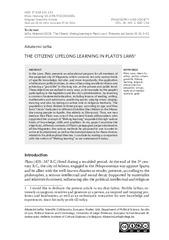Приказ основних података о документу
The Citizens’ Lifelong Learning in Plato’s Laws
Doživotno učenje građana u Platonovim Zakonima
| dc.creator | Lefka, Aikaterini | |
| dc.date.accessioned | 2023-03-30T10:14:29Z | |
| dc.date.available | 2023-03-30T10:14:29Z | |
| dc.date.issued | 2023 | |
| dc.identifier.issn | 0353-5738 | |
| dc.identifier.uri | https://journal.instifdt.bg.ac.rs/index.php/fid/article/view/1533 | |
| dc.identifier.uri | http://rifdt.instifdt.bg.ac.rs/123456789/2797 | |
| dc.description.abstract | In the Laws, Plato presents an educational program for all members of the projected city of Magnesia, which concerns not only various kinds of specific knowledge, but also, and more importantly, the application of ethical and political virtues, in view of becoming excellent citizens and achieving a “good life” in the long run, at the private and public level. These objectives are realised in many ways, as for example, by the people’s participating in the legislation and the city’s administration, by receiving a common fundamental education, including lessons of reading, writing, mathematics and astronomy; practicing sports; playing music; singing; dancing and also by taking an active role in religious festivals. The population is then divided in three groups, according to age, and they form “choirs” dedicated to different divinities (the children to the Muses, the young people to Apollo, the elderly to Dionysus). Thus, we may deduce that Plato was one of the ancient Greek philosophers who supported the concept of “lifelong learning,” expanded through various kinds of knowledge, skills and qualities. In my paper I examine the objectives, different contents of Plato’s pedagogical project destined to all the Magnetes, the various methods he proposed to use in order to arrive at its attainment, as well as the eventual reasons for these choices, related to his philosophical theories. I conclude by making a comparison with the notion of “lifelong learning” as we understand it today. | sr |
| dc.description.abstract | U Zakonima, Platon predstavlja obrazovni program za sve članove zamišljenog grada Magnezije koji se tiče ne samo različitih vrsta specifičnog znanja već i, još važnije, primene etičkih i političkih vrlina sa ciljem da se stvore odlični građani koji će moći da žive „dobar život“ na duge staze kako u privatnom tako i u javnom smislu. Ovi ciljevi mogu biti ostvareni na mnoštvo načina, kao, na primer, kroz učestvovanje pojedinaca i pojedinki u zakonodavstvu i upravljanju gradom, kroz zajedničko osnovno obrazovanje koje bi uključivalo čitanje, pisanje, matematiku i astronomiju, kroz vežbanje sporta, kroz pevanje i igranje, kao i kroz aktivno učestvovanje u religioznim festivalima. Stanovništvo se tada deli u tri grupe prema starosti, te se formiraju „horovi“ koji su posvećeni različitim božanstvima (deca su posvećena muzama, mladi ljudi su posvećeni Apolonu, a stari ljudi su posvećeni Dionisu). Dakle, možemo zaključiti da je Platon bio jedan od drevnih grčkih filozofa koji je podržavao koncept „doživotnog učenja“, proširen kroz različite vrste znanja, veština i kvaliteta. U svom radu, ispitujem ciljeve, različite sadržaje Platonovog pedagoškog projekta koji je namenjen svim stanovnicima Magnezije, različite metode koje je Platon predlagao kako bi se došlo do postizanja pedagoških ciljeva, kao i eventualne razloge za ove izbore u skladu sa njegovom filozofskom teorijom. Rad zaključujem tako što pravim poređenje sa pojmom „doživotnog učenja“ kako ga danas razumemo. | sr |
| dc.language.iso | en | sr |
| dc.publisher | Beograd : Institut za filozofiju i društvenu teoriju | sr |
| dc.rights | openAccess | sr |
| dc.rights.uri | https://creativecommons.org/licenses/by-nc-nd/4.0/ | |
| dc.source | Filozofija i društvo / Philosophy and Society | sr |
| dc.subject | Plato | sr |
| dc.subject | Laws | sr |
| dc.subject | ideal city | sr |
| dc.subject | ethics | sr |
| dc.subject | politics | sr |
| dc.subject | citizen | sr |
| dc.subject | good life | sr |
| dc.subject | lifelong learning | sr |
| dc.subject | religious | sr |
| dc.subject | ethical and civic education | sr |
| dc.title | The Citizens’ Lifelong Learning in Plato’s Laws | sr |
| dc.title | Doživotno učenje građana u Platonovim Zakonima | sr |
| dc.type | article | sr |
| dc.rights.license | BY-NC-ND | sr |
| dc.citation.issue | 1 | |
| dc.citation.volume | 34 | |
| dc.citation.spage | 5 | |
| dc.citation.epage | 31 | |
| dc.identifier.doi | 10.2298/FID2301005L | |
| dc.type.version | publishedVersion | sr |
| dc.identifier.fulltext | http://rifdt.instifdt.bg.ac.rs/bitstream/id/9697/bitstream_9697.pdf |

